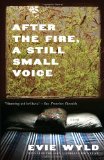Summary | Excerpt | Reading Guide | Reviews | Beyond the Book | Read-Alikes | Genres & Themes | Author Bio

Critics' Opinion:
Readers' Opinion:
First Published:
Aug 2009, 304 pages
Paperback:
Nov 2010, 304 pages
 Book Reviewed by:
Book Reviewed by:
Judy Krueger
Buy This Book
This article relates to After the Fire, a Still Small Voice
When war broke out in Korea in June 1950, the United Nations Security Council asked all of its members to assist in repelling the North Korean invasion into South Korea. North Korea was under the influence of the Soviet Union and later in the war Communist China entered the fray as well. Fifteen nations sent contingents to defend South Korea, with the United States being the largest.
Australia committed a squadron of Air Force personnel, equipment, and a battalion from the Royal Australian Regiment. The country's security was felt to be at risk from Communist aggression and the Prime Minister was eager to show its full support of the United Nations. More particularly he wanted to secure a formal alliance with the United States, who were assuming the former British Empire's dominance in Asia. The result was the ANZUS Treaty of 1951. Casualties from Australian troops came to over 1500, with 339 killed.
The Australian participation in Vietnam was more complex. For decades, the country had felt alone as a predominantly White nation in a region of Asian peoples. The history of Indonesian independence from the Dutch, which took place in the 1950s, was fraught with perceived danger for Australia because of the Dutch presence in West New Guinea and the fear of Indonesian Communism coming into Australia via that island. Australia relied heavily on the presence of the United States in Southeast Asia for combating the threat of Chinese Communist aggression, but the ANZUS treaty had proved to be vague in defining the defense America might provide in the event of trouble with China; and the size and strength of the Australian military was woefully inadequate.
As the Vietnam conflict heated up, Australia adopted a policy of supporting American military involvement and encouraging its continuation. They first sent a team of military advisors in August 1962. The institution of a draft in late 1964 allowed sufficient build up of military personnel to man a battalion of the Royal Australian Regiment, sent to assist in the defense of American bases in South Vietnam. 1966 saw the creation of the Australian Task Force, consisting of two infantry battalions and various support units. By 1967, the country had also sent Navy and Air Force men.
Overall, Australian participation in the Vietnam War lasted for ten years. Almost 47,000 men were sent, close to 500 were killed, and about 2400 wounded. Beginning with the draft in 1964, a vocal minority made up of middle-class parents, clergy and numerous dignitaries made the war unpopular. As the war continued, a protest movement grew and while it was never as large as in the United States, the effect on Australian society made a soldier's homecoming traumatic, created a sense of alienation and caused him difficulties in returning to civilian life.
Filed under People, Eras & Events
![]() This "beyond the book article" relates to After the Fire, a Still Small Voice. It originally ran in October 2009 and has been updated for the
November 2010 paperback edition.
Go to magazine.
This "beyond the book article" relates to After the Fire, a Still Small Voice. It originally ran in October 2009 and has been updated for the
November 2010 paperback edition.
Go to magazine.





The Funeral Cryer by Wenyan Lu
Debut novelist Wenyan Lu brings us this witty yet profound story about one woman's midlife reawakening in contemporary rural China.
Your guide toexceptional books
BookBrowse seeks out and recommends the best in contemporary fiction and nonfiction—books that not only engage and entertain but also deepen our understanding of ourselves and the world around us.